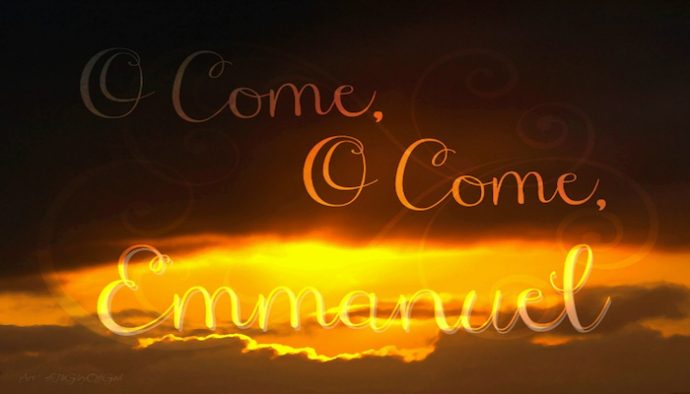“O Come O Come Emmanuel” was originally written in Latin, first documented in Germany in 1710. The tune for the words was created separately, and first linked with the hymn in 1851.
The song is played in a minor key, which is fitting, since it is a song that expresses the deep longing of our souls. We, in our brokenness, know that all it not indeed well, and we are reminded of it every day. We are reminded of our great fallenness in our homes, in our world, and even in our most silent moments when we look inside ourselves. We are a people of longing – longing for true joy, for true satisfaction, for true life.
True enough, we have many methods for escaping that longing. We drink it away, we sex it away, we work it away, we can even try to church it away – and yet it persists. The treadmill of life and the disappointment therein remains. We are longing for what only Jesus can bring, just as Israel was longing for centuries for the coming of God’s chosen One who would be their deliverer.
And while Israel longed for a physical delivery, we know now that our physical deliverance from circumstantial tribulation is only a shadow of the greater deliverance we need, and therefore the greater longing that permeates every experience of our lives. In this mournful, but hopeful, tune we find these lyrics:
O come, Thou Day-Spring, come and cheer
Our spirits by Thine advent here
Disperse the gloomy clouds of night
And death’s dark shadows put to flight.
Rejoice! Rejoice! Emmanuel
Shall come to thee, O Israel.
Jesus is called the “Day-Spring.” The dayspring is the dawn – it’s that moment, which ebbs and flows according to the season, when light first breaks over the darkness. But it’s more than that – it’s the first sign every day of the dispelling of darkness. It is the daily reminder that the mercies of God are new every morning, that despite our sin and rebellion, God did it once again today as the sun has come up. And if you’ve ever spent one of those nights alone – the kind of night where you can’t get away from your own thoughts, the kind of night that seems to go on forever, the kind of night where you are overcome by fear and doubt – you know the simple preciousness of that first light of dawn.
The sun has indeed come up again. Tomorrow is now today. And in the context of this song, this is Jesus – He is the dawn that dispels the darkness and brings the evidence of God’s enduring faithfulness. It was as Zechariah said when he prophesied about his own son, John the Baptist, as the forerunner of the Messiah:
“Because of our God’s merciful compassion,
the Dawn from on high will visit us
to shine on those who live in darkness
and the shadow of death,
to guide our feet into the way of peace” (Luke 1:78-79).
No wonder the author says that our spirits, which are so filled with longing, are cheered by this appearing. The clouds of night are dispersed, and death’s dark shadows put to flight. This shadow – the shadow of knowing that right now you and I are both one moment closer to an inevitable death – is put to flight, for Jesus in his appearing has taken away the sting of death. He has transformed our vision of death from loss to gain; from punishment to reward; from hopelessness to the entrance into our true home.
Rejoice, Christian! Rejoice even in the midst of your longing, for God has shown that He is with us. He is Emmanuel, and He has come to His people.
Subscribe to MichaelKelley.co
Never miss a new post. Subscribe to receive these posts in your inbox and to receive information about new discipleship resources.




1 Comment